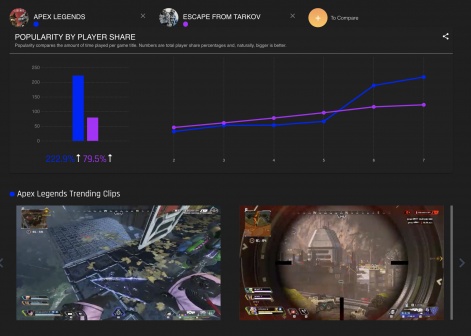Short-form video platform Medal yesterday announced its new platform Medal Trends. We caught up with CEO Pim De Witte to discuss the real-time data platform. Witte also let us in on what has made the company successful over the past year.
Tell us about your company.
Medal is a short-form video platform for games. We believe short-form video, when done right, can change how we discover games, entertain ourselves, and share moments with friends. Medal records your gaming sessions and lets you easily pull short clips of your best moves, kills, and highlights. Then that short clip can be shared via a wide array of social platforms, from Twitter and Facebook to SMS and WhatsApp, or broadcast on Instagram, TikTok, and more.
We’ve also just released a new analytics platform, Medal Trends, which makes it easier for industry professionals, journalists, and content creators to identify popular and viral games. This lets them make better, more informed decisions on which games to invest in, partner with, stream, or cover.
How has the last year been for you?
The last year has been good. Starting a new company is hard, but I’m thankful to work with such a great team. We have hit a few milestones in the last 12 months. We expanded our community, which now has millions of gamers in it, helped creators capture and share hundreds of thousands of videos per day and kept the community super engaged while launching important updates and shipping new products.
That's on top of raising $9m in a Series A funding round, led by Horizons Ventures. Since the Series A we’ve grown 15 times in how many clips are captured and shared, and 10 times in terms of daily active users, expanded our team to nearly 30 people, partnered with TikTok and Tumblr, giving our users new platforms to share their clips on and acquired Megacool.co, bringing their mobile clipping and sharing SDK into Medal and helping us expand further into the mobile market.
It’s been a big 12 months and I’m proud of everyone here.
What challenges are facing your sector in the market?
The biggest challenge by far is fragmentation and commoditisation. Fragmentation because gamers are on so many devices, and each device manufacturer, OS distributor, and game developer have different business interests.
This leads to a lot of uncertainty in terms of being able to provide the same level of service everywhere and in the way users expect. Also, because gamers are so technical, product expectations for a service like ours are very high and the competition is high calibre. This is great for consumers but can be challenging for companies trying to breakthrough.
Discord did a great job at showing the industry how to build a non-fragmented product that can scale to multiple devices by focusing a lot on a great mobile experience and using that to bridge social connections on lots of different platforms. I expect we’ll see more of this.
What do you think are the most exciting trends in games right now?
We’re seeing a lot of funding in the space, which is exciting as it creates the opportunity for new services to emerge that other companies can build on. Discord is a great example of a platform that recently broke through and has enabled new types of experiences to exist and do so at a massive scale, but I suspect we’ll see more of these services and companies springing up soon. We’re hoping to be one of them.
This is also going to help streamers and content creators get discovered more because there will be more platforms to create good content on.
Secondly, and perhaps slightly more controversial, I’m very excited about the prospect of hardcore mobile gaming. Mobile is such an exciting space to be in right now, as we are starting to see the emergence of cross-platform social (Fortnite, Roblox, etc), which is going to enable completely new and different types of social interactions between players.
We believe current mobile titles are only scratching the surface of what's possible when you bring people together around amazing experiences at scale. The recent gain in popularity of hardcore mobile titles such as Call of Duty, Arena of Valor, and Garena Free Fire is only going to drive more developer investment, and we couldn't be more excited to be part of the movement.
What are your aims for the coming year?
Well, we are still a young company trying to scale with the growth of our service, but if all goes well we should start raising our next round soon, see our platform continue to expand at the same rate, if not quicker, and expand the team to about 50 people to support that. I’d also really like to focus on reaching the same level of success on mobile as we have on PC.
How did you come up with your companies name?
Back in our teenage years, we ran RuneScape community servers and the colour of our logo was gold. The Medal logo is a silent continuation of that community and dedication to them because we were sad about having to shut it down. Nobody did gold logos in the way we did, and we wanted to keep the colour but there were very little names that made sense and fit the colour. Eventually, we landed on Medal, after scrapping 'Clipz', which, in retrospect, would have been terrible.
What was the thought process behind the new Medal Trends platform?
Our initial thinking behind Trends wasn’t to build an analytics business - it was to help content creators make better investments in the games they invest their time in. We wanted to be able to tell creators: 'Hey - I would recommend building a following in this game, as it’s likely to stick around for a while.'
It bothered us that we would see games that didn’t trend well on our platform get hyped up on other platforms with marketing dollars, only to make creators enter a state of fear-of-missing-out and take unnecessary risks with their audiences. We saw this happen on Medal, and we saw it happening on other platforms, and that’s why we initially build trends - to help creators take more informed risks.
Then, we started realising all the potential of the product and expanded it into an analytics product for the industry. We use these same trends internally to make business decisions and think others can benefit from it as well.

How does Medal Trends differ from its competition?
First and foremost, it’s free. These services have historically been inaccessible to the public and expensive. We think that putting Medal Trends out there for free is the right thing to do, but also as a company, we have an incentive to help make the content creators who use Medal more effective at growing their audiences. Trends also isn’t focused on converting you to a paid user as quickly as possible - it’s meant to feel familiar and gets you to do what you need to get done, quicker.
Medal Trends is also unique in the sense that we don’t give absolute numbers. This changes how we think about analytics and trends, and I strongly believe it will do so in a meaningful way because relative numbers to the industry automatically account for holidays and times of increased and decreased player activity. This will also help teams realize whether they are doing well over time, instead of worrying about temporarily decreased player numbers and worrying it’s just them.
There simply aren’t many services that make these things accessible in the way we do, so we are not necessarily worried about competing. If Medal Trends ends up as a great platform for our creators to be better, that’s awesome. If it ends up as an industry leader in privacy-respecting gaming analytics, that’s also great. We are happy to be with the community in either scenario and are just glad this finally exists.
Who do you think will benefit the most from the real-time data platform?
Initially content creators, marketers, and journalists. A creator might ask “Where should I invest my time or build my audience” and this will help them find the right fit. A journalist may want to quickly back up a story with data or identify a game rising in popularity to cover.
An investor may be looking to see what is growing fastest, or a marketer may be looking for a stable long-term title to partner with or support. Medal Trends is there for all of them. Long-term we even believe players will make decisions on what they play next based on how a community is trending - because, as somebody who has played games their whole life, nothing is more frustrating than investing hundreds of hours in a game that eventually dies down.













